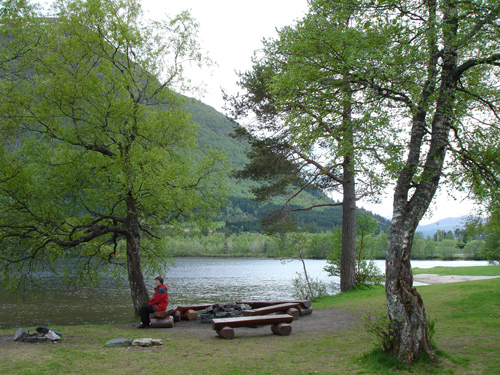After having written quite a bit about weblogs lately, it seems like this is the year of the game. I am (finally) deeply submerged in writing about games and game studies for a Norwegian audience, I have outlined two projects to do with Jill and Hilde and started working on one of these, and I am looking at the CFP for DAC 2007 in Perth, trying to decide if what I am doing for the other projects will fit there.
Oddly, while I was writing about weblogs, I wanted to get back to gaming. Now I feel like I am neglecting the work I want to do on weblogs. I keep moving back and forth between the topics, seeing an increasing number of important points where the work touches. My wild fancy of where my research would be in 2010 look less like wild imagination and more like some odd premonition.
Wednesday, May 31, 2006
15 page definition
Salen and Zimmerman devote 15 pages to the definition of "game". There is no way I can do a similar exposition, as the whole chapter devoted to the "nature" of computer games is supposed to be 15 pages. 3 pages, max. But they did a lot of the work for me, as I now know what books to pull out of the shelf in order to write this chapter. And I get to do it in Norwegian, which means I don't need to work on the other meanings of the word (he smelled game, she was game), either of game or of play. Lucky me, I can use "spill" and "spille", noun and verb obviously and clearly connected.
Tuesday, May 30, 2006
Monday, May 29, 2006
Can questions grow old?
One of the big issues around the college this week is a news item about our journalism students getting an "old" exam (in Norwegian). The question, as well as the guide for the assessors, has been available online since the question was asked in this form for the first time, in 2003, and it was reused now, in 2006. The students are complaining, they feel they are not being sufficiently respected as the professors are re-using questions.
For this to become such a huge issue is mainly an example of the danger of teaching journalists. In every news-room in Norway there is at least one person who'd like to get back at us - either because they were our students and are frustrated about that for some reason, or because they never got into the study, and are frustrated about that for some reason. Hence, anything that can look like an error becomes a big deal.
The debate on whether to use "old" questions or not is however rather interesting. There is a limited amount of central problems in any limited field of study. This comes from the way exams are set up: they have to relate to what has been taught, what we can expect students to be able to answer within this framework, and what kind of skills we want them to display. This means that already, without using the exact same words as in the question we gave 3 years ago, we tend to recycle problems. "Define integrity in journalism, and discuss the possible flaws in the integrity of the participants in this media debate." Next year it may be "In the two articles which comes with this question, you see a dicussion on integrity in journalism. What are the main issues of the debate, and how do the participants relate to the definition of integrity on your reading lists?" Some new examples, some new wording, same old very important question, if you are discussing journalistic integrity and ethics.
The main problem is that the students also had access to the "correct answer" - the guide given to the assessors. At Volda College some of the staff give out these in order to let the students understand the reasoning behind their grade. This lets the current students understand more about how they could have aswered a question, while new students understand the reasoning behind this type of questions. I am not certain that I agree that these guidelines should be made public, exactly because they may be read as a fasit, the final, authorative way to answer a question. They are not, they are a hint to the assessors about what we expect the students of the class 2003 to be able to write on this subject. The target group for the assessor guidelines is not the students, but the assessors.
But back to the original question: Can questions grow old? I say no. The reason why it appears like they are growing old is the openness practiced in the Norwegian educational system. We give our students access to just about everything around the study, and old exam questions are and have always been seen as an excellent tool for students who want to prepare for tests. By seeing what has been asked in the past, they can prepare for what we may ask this year. When I was a student, back in the stone age before computers, people compared years of question collections, noted which questions showed up frequently and which were never asked, and gauged their chances by these collections. They - we - would read according to complex formulas of chance for being asked one question and not another, a strategic reading which gave a certain direction to an otherwise fairly disorganised student life. Professors knew this, of course, and would plan the questions according to the same lists - and yes, occasionally we'd get the exact same question as somebody had asked 3 - 5- 7 - years earlier.
In other countries I have found that some teachers are shocked by this kind of openness. They hardly talk about their questions to other teachers, much less let the students see what has been used for exams on the subject for the last 10 years. That kind of exclusiveness might have made the students in Volda think we respected their work more. I see this as the opposite of respect. It lets professors re-use the same stack over and over again, holding back a valuable study tool from the students, forcing them to work with maximum insecurity and rely on rumours when it comes to what the professor may ask at the end of term. It also lets professors settle into stale patterns without fear of being officially discovered.
Which will happen in the Norwegian system, if you re-use questions, as we just saw.
I say: That's a good thing. So somebody re-used a question. The PROBLEM the question addresses is as important now as it was in 2003. Only this year, in the assessors guidelines, the old guidelines must be included, with the note: "This is the kind of information students knew about before the exam, and we expect a brilliant student to relate to this and go one step further."
Perhaps that challenge is too much for some?
For this to become such a huge issue is mainly an example of the danger of teaching journalists. In every news-room in Norway there is at least one person who'd like to get back at us - either because they were our students and are frustrated about that for some reason, or because they never got into the study, and are frustrated about that for some reason. Hence, anything that can look like an error becomes a big deal.
The debate on whether to use "old" questions or not is however rather interesting. There is a limited amount of central problems in any limited field of study. This comes from the way exams are set up: they have to relate to what has been taught, what we can expect students to be able to answer within this framework, and what kind of skills we want them to display. This means that already, without using the exact same words as in the question we gave 3 years ago, we tend to recycle problems. "Define integrity in journalism, and discuss the possible flaws in the integrity of the participants in this media debate." Next year it may be "In the two articles which comes with this question, you see a dicussion on integrity in journalism. What are the main issues of the debate, and how do the participants relate to the definition of integrity on your reading lists?" Some new examples, some new wording, same old very important question, if you are discussing journalistic integrity and ethics.
The main problem is that the students also had access to the "correct answer" - the guide given to the assessors. At Volda College some of the staff give out these in order to let the students understand the reasoning behind their grade. This lets the current students understand more about how they could have aswered a question, while new students understand the reasoning behind this type of questions. I am not certain that I agree that these guidelines should be made public, exactly because they may be read as a fasit, the final, authorative way to answer a question. They are not, they are a hint to the assessors about what we expect the students of the class 2003 to be able to write on this subject. The target group for the assessor guidelines is not the students, but the assessors.
But back to the original question: Can questions grow old? I say no. The reason why it appears like they are growing old is the openness practiced in the Norwegian educational system. We give our students access to just about everything around the study, and old exam questions are and have always been seen as an excellent tool for students who want to prepare for tests. By seeing what has been asked in the past, they can prepare for what we may ask this year. When I was a student, back in the stone age before computers, people compared years of question collections, noted which questions showed up frequently and which were never asked, and gauged their chances by these collections. They - we - would read according to complex formulas of chance for being asked one question and not another, a strategic reading which gave a certain direction to an otherwise fairly disorganised student life. Professors knew this, of course, and would plan the questions according to the same lists - and yes, occasionally we'd get the exact same question as somebody had asked 3 - 5- 7 - years earlier.
In other countries I have found that some teachers are shocked by this kind of openness. They hardly talk about their questions to other teachers, much less let the students see what has been used for exams on the subject for the last 10 years. That kind of exclusiveness might have made the students in Volda think we respected their work more. I see this as the opposite of respect. It lets professors re-use the same stack over and over again, holding back a valuable study tool from the students, forcing them to work with maximum insecurity and rely on rumours when it comes to what the professor may ask at the end of term. It also lets professors settle into stale patterns without fear of being officially discovered.
Which will happen in the Norwegian system, if you re-use questions, as we just saw.
I say: That's a good thing. So somebody re-used a question. The PROBLEM the question addresses is as important now as it was in 2003. Only this year, in the assessors guidelines, the old guidelines must be included, with the note: "This is the kind of information students knew about before the exam, and we expect a brilliant student to relate to this and go one step further."
Perhaps that challenge is too much for some?
Wednesday, May 24, 2006
The rumours of my travels
It seems like my fame travels even more than me - this blogger reports having seen me at blogtalk downunder in 2005:
Much as I like Australia, sorry, but I wasn't there. Seems like my blog was though, linking here and there and showing up at conferences without me...
One blogger from Norway, I think I met at the Blog Talk Down Under Conference last year...
Much as I like Australia, sorry, but I wasn't there. Seems like my blog was though, linking here and there and showing up at conferences without me...
Tuesday, May 23, 2006
Accessible games?
From my inbox today, a very interesting project: Game Accessibility, focusing on making games accessible to disabled players.
A great challenge and definitely a correction to those who might believe that "online the body does not matter". This is a sharp reminder that to some the body still makes a difference, even in digital spaces.
A great challenge and definitely a correction to those who might believe that "online the body does not matter". This is a sharp reminder that to some the body still makes a difference, even in digital spaces.
Monday, May 22, 2006
Let me screw up!
As I am looking for solutions for making my mobile phone and my PC cooperate and help me keep my appointments up to date, I see that a lot would be easily fixed if I just trusted all my data to microsoft. But I am very resistant to this, despite the fact that I constantly use their products, I have a PC not an apple, and I am increasingly unimpressed with the apple products when it comes to text-editing and gaming, two areas where I am a very active computer user.
So, I am trying to understand why I resist microsoft so badly.
First and most important I think is the fact that I have no real options. The college does not support apple computers and I am not sufficiently skilled to start using Linux without setting my work aside and spend the next year getting used to a totally new operating system. And so I can't really choose. It's microsoft, or a year's pause in all I do (optimistic estimate). This is enough to make me bristle and want to break something.
Second, microsoft gives me no options. The operating system is built in a way that makes it extraordinary hard to make choices and changes. If I want to install - or de-install - a program, microsoft makes me go through a long and complicated process just to be able to see the files I want to move around. It hides information from me, and gives me information that's totally useless. A lot of my early time with any new computer is spent turning off tooltips and warnings of different kinds, and giving myself permissions I didn't know I needed to have. This of course changes from time to time, so with an update comes new and fascinating problems. Or just plain annoying ones. Like now: I can't figure out how to make msn STOP popping up to cover half my screen every time I turn this computer on. I was foolish enough to update msn, and now I can't find the settings which will let me say: No, I DON'T want to start the day by logging into msn, and I don't want to stare at that ugly box every morning at work. Being forced to relate to the software in one certain manner, so heavily controlled by the programmers who think they know what is good for me gives the same reaction as having to buy the software in the first place: I want to break something.
This desire seems to be shared by hackers all over the world. They enjoy breaking the microsoft system. Hence, being a moderately skilled computer user with no programming skills and very little knowledge about what goes on beyond the interfaces I am most interested in, I am a victim of all viruses and hacks spread through the net. Well, not all really, I have been lucky and have not been the victim or too many viruses so far (wood, wood, I need to knock on wood to take the hex off me just from typing that...). However: I am convinced that the reason why I have been so lucky is that I don't use outlook express any more. Of all the things I am unhappy about from microsoft, outlook is perhaps the worst.
I can't use it just as a reader, if I use it the emails will immediately be sucked out of their nest on the server where I want them, and down to my computer. This means that all spam, viruses and everything is now in a file on my vulnerable little amateur system.
All those other frustrated users who want to break something just love sending their bombs by emails, specialised little bombs that are created with the sole purpose of corrupting microsoft systems in different manners.
Outlook is the one program everybody else relate to when they want to address a "standard" of email/address/calendar systems. Again, no options. By now, I think you know how I feel about that.
And after this is all said and done: With the next version of their software, they will have changed all the things I have to add, delete, click, open, close, allow or disallow in order to make the software function the way I like it. They keep me constantly unhappy and frustrated, by throwing new puzzles in my way. Now if I could choose if I wanted to solve them or not, I'd be fine, but having to spend an hour figuring new ways to get the permission I need so that I can move one file from one folder to another in order to make End Note work... I really need to make End Note work, I can't NOT spend that time looking for the one correct box to click... well, it makes me a lot more aggressive than computer games do.
I think my dislike of and frustration with microsoft software is caused by these things, in falling order:
I can't escape it.
I can't be certain that the skill I have gained through being an active user of it will be valid when it comes to solving the next problem.
It treats me as if I am the main threat against the integrity of the system.
I put that last part at the bottom, although that's the thing which really insults me. I did that because even when I am really frustrated I know that the main cause of PC screwups is computer users... I just want to have the freedom to screw up if that is what I really want to do.
Then again: If in USA somebody allows me to screw up - I'll probably find a lawyer and sue them. And so we come full circle.
So, I am trying to understand why I resist microsoft so badly.
First and most important I think is the fact that I have no real options. The college does not support apple computers and I am not sufficiently skilled to start using Linux without setting my work aside and spend the next year getting used to a totally new operating system. And so I can't really choose. It's microsoft, or a year's pause in all I do (optimistic estimate). This is enough to make me bristle and want to break something.
Second, microsoft gives me no options. The operating system is built in a way that makes it extraordinary hard to make choices and changes. If I want to install - or de-install - a program, microsoft makes me go through a long and complicated process just to be able to see the files I want to move around. It hides information from me, and gives me information that's totally useless. A lot of my early time with any new computer is spent turning off tooltips and warnings of different kinds, and giving myself permissions I didn't know I needed to have. This of course changes from time to time, so with an update comes new and fascinating problems. Or just plain annoying ones. Like now: I can't figure out how to make msn STOP popping up to cover half my screen every time I turn this computer on. I was foolish enough to update msn, and now I can't find the settings which will let me say: No, I DON'T want to start the day by logging into msn, and I don't want to stare at that ugly box every morning at work. Being forced to relate to the software in one certain manner, so heavily controlled by the programmers who think they know what is good for me gives the same reaction as having to buy the software in the first place: I want to break something.
This desire seems to be shared by hackers all over the world. They enjoy breaking the microsoft system. Hence, being a moderately skilled computer user with no programming skills and very little knowledge about what goes on beyond the interfaces I am most interested in, I am a victim of all viruses and hacks spread through the net. Well, not all really, I have been lucky and have not been the victim or too many viruses so far (wood, wood, I need to knock on wood to take the hex off me just from typing that...). However: I am convinced that the reason why I have been so lucky is that I don't use outlook express any more. Of all the things I am unhappy about from microsoft, outlook is perhaps the worst.
I can't use it just as a reader, if I use it the emails will immediately be sucked out of their nest on the server where I want them, and down to my computer. This means that all spam, viruses and everything is now in a file on my vulnerable little amateur system.
All those other frustrated users who want to break something just love sending their bombs by emails, specialised little bombs that are created with the sole purpose of corrupting microsoft systems in different manners.
Outlook is the one program everybody else relate to when they want to address a "standard" of email/address/calendar systems. Again, no options. By now, I think you know how I feel about that.
And after this is all said and done: With the next version of their software, they will have changed all the things I have to add, delete, click, open, close, allow or disallow in order to make the software function the way I like it. They keep me constantly unhappy and frustrated, by throwing new puzzles in my way. Now if I could choose if I wanted to solve them or not, I'd be fine, but having to spend an hour figuring new ways to get the permission I need so that I can move one file from one folder to another in order to make End Note work... I really need to make End Note work, I can't NOT spend that time looking for the one correct box to click... well, it makes me a lot more aggressive than computer games do.
I think my dislike of and frustration with microsoft software is caused by these things, in falling order:
I can't escape it.
I can't be certain that the skill I have gained through being an active user of it will be valid when it comes to solving the next problem.
It treats me as if I am the main threat against the integrity of the system.
I put that last part at the bottom, although that's the thing which really insults me. I did that because even when I am really frustrated I know that the main cause of PC screwups is computer users... I just want to have the freedom to screw up if that is what I really want to do.
Then again: If in USA somebody allows me to screw up - I'll probably find a lawyer and sue them. And so we come full circle.
Friday, May 19, 2006
Meta blogging
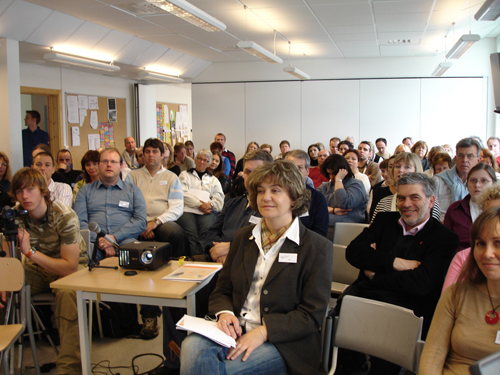
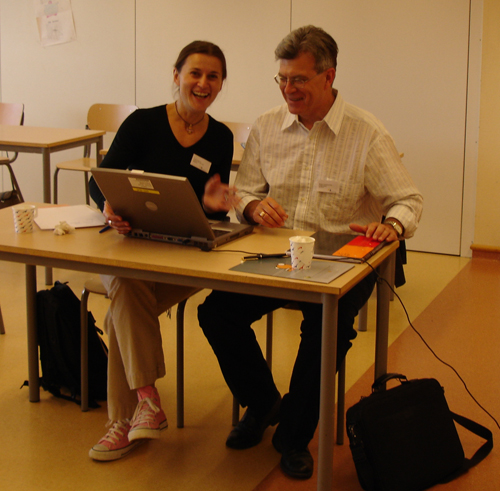
Making the audience participate in a meta moment, the blogger talking about the blogs as a site for a metalogue blogging the audience to make them part of the metalogue, and then later the meta aspect is upped, as the blogger blogs the bloggers blogging - and perhaps the bloggers blog the blogger blogging the bloggers blogging?
Lotus Organizer?
Kicking back between sessions, and I am looking at software to use with cellphones. Returning readers may know that I am not happy with the positioning of my birthday. The high pressure on the family's resources in February has caused my birthday present to be horribly delayed this year - like most years. But that means I have plenty of time to plan what I want - and what I want this year is a cellphone with a calendar function which can easily be integrated with a calendar on the PC.
At the moment I use Groupwise for the PC - it's the program the college uses, and it gives me a calender which I can find online (everything saved on the college server), but which can't be synchronised with the cellphone. That is, unless I buy a BlackBerry. Which is a big ugly lump. This way I have to do the synchronisation manually, and I also have to refuse to make appointments unless I have access to my computer, as there may be things I have not put into the cellphone. This is very annoying, and I would like to find a solution to this.
One solution would be to just start using Outlook Express, by Microsoft. Most cellphones with calendars can be connected to this, and it would be a trivial matter to solve my problem. However... well, you all know about the danger of catching bad viruses through Outlook. I live in terror of having all my notes deleted by a virus, it would feel worse I think than just having them stolen.
So now I am looking at Lotus Organizer by IBM. This is the other system that Nokia phones can cooperate with through their PC suite. I can of course get another phone than Nokia - Motorola have some neat ones, although after finding their ad where the girl holding the phone looks like she is about to masturbate I am a little less enthosiastic about that. Sony Eriksson is much better on the combination bluetooth - triband, both of which I need, but they only synchronise their PC Suite with Outlook. If not something better.
At the moment I use Groupwise for the PC - it's the program the college uses, and it gives me a calender which I can find online (everything saved on the college server), but which can't be synchronised with the cellphone. That is, unless I buy a BlackBerry. Which is a big ugly lump. This way I have to do the synchronisation manually, and I also have to refuse to make appointments unless I have access to my computer, as there may be things I have not put into the cellphone. This is very annoying, and I would like to find a solution to this.
One solution would be to just start using Outlook Express, by Microsoft. Most cellphones with calendars can be connected to this, and it would be a trivial matter to solve my problem. However... well, you all know about the danger of catching bad viruses through Outlook. I live in terror of having all my notes deleted by a virus, it would feel worse I think than just having them stolen.
So now I am looking at Lotus Organizer by IBM. This is the other system that Nokia phones can cooperate with through their PC suite. I can of course get another phone than Nokia - Motorola have some neat ones, although after finding their ad where the girl holding the phone looks like she is about to masturbate I am a little less enthosiastic about that. Sony Eriksson is much better on the combination bluetooth - triband, both of which I need, but they only synchronise their PC Suite with Outlook. If not something better.
Talk links Lillehammer
Peter Lunenfeld: The Digital Dialectic
Rebecca Blood: Weblog History
CBS: Who's blogging the convention
CBS: 'Blog' is runaway word of the year
Perseus Blog Survey - the blog geyser
Perseus Blog Survey Weblog
Jill Walker: Weblog definition
Jill Walker: Should we tell our students to blog pseudonymously?
Barbara Ganley: how far is too far?
Adrian Miles: Vogma: A Manifesto
The web as a space for collecting and sharing ideas: Vannevar Bush' Memex machine
Rebecca Blood: Weblog History
CBS: Who's blogging the convention
CBS: 'Blog' is runaway word of the year
Perseus Blog Survey - the blog geyser
Perseus Blog Survey Weblog
Jill Walker: Weblog definition
Jill Walker: Should we tell our students to blog pseudonymously?
Barbara Ganley: how far is too far?
Adrian Miles: Vogma: A Manifesto
The web as a space for collecting and sharing ideas: Vannevar Bush' Memex machine
What do I do today?
From a colleague, who informed the rest of the department about what I do today, a news article (in Norwegian) which tells us that I am talking to teachers from 30 different European countries today. I am quite impressed!
Thursday, May 18, 2006
Education in blogging links
When I try to research this, I find that I probably don't use the correct search words, or that what I expected is just not there.
First, a link to HigherEd BlogCon, which was in April this year.
Several of the articles in the 2004 collection Into the Blogosphere are on teaching, and I want to point particularly to Remediation, Genre and Motivation: Key Concepts for Teaching with Weblogs.
I find several sites devoted to and discussing education and teaching at higher levels, some of the weblogs of people I think of as friends are among these:
Jill/txt
Culturecat
Jerz' Literacy Weblog
Vitia
With a slight change to my search topics, from education to teaching, I had a larger and more relevant group of hits:
A History Teacher - with several links to other teachers
hipteacher - with a lot of links, but dated 2005
Weblogg-ed
Ms Frizzle
Edblogger praxis - last post oct 2005
EdWeek.org, the Blogboard
I have not been able to find good European examples. There are attempts in Danish and Norwegian, and there is obviously an interest in and a will to use blogs, but not the same enthusiasm as it seems American teachers feel. It may also be that if I had been fluent in German, French, Italian, Spanish, Greek, Dutch and a long list of other languages, I would have found a much wider variety. The many language communities of Europe makes it harder to reach a massive audience - but that may not be neccessary for a good teaching weblog.
First, a link to HigherEd BlogCon, which was in April this year.
Several of the articles in the 2004 collection Into the Blogosphere are on teaching, and I want to point particularly to Remediation, Genre and Motivation: Key Concepts for Teaching with Weblogs.
I find several sites devoted to and discussing education and teaching at higher levels, some of the weblogs of people I think of as friends are among these:
Jill/txt
Culturecat
Jerz' Literacy Weblog
Vitia
With a slight change to my search topics, from education to teaching, I had a larger and more relevant group of hits:
A History Teacher - with several links to other teachers
hipteacher - with a lot of links, but dated 2005
Weblogg-ed
Ms Frizzle
Edblogger praxis - last post oct 2005
EdWeek.org, the Blogboard
I have not been able to find good European examples. There are attempts in Danish and Norwegian, and there is obviously an interest in and a will to use blogs, but not the same enthusiasm as it seems American teachers feel. It may also be that if I had been fluent in German, French, Italian, Spanish, Greek, Dutch and a long list of other languages, I would have found a much wider variety. The many language communities of Europe makes it harder to reach a massive audience - but that may not be neccessary for a good teaching weblog.
Weblog Literacy
Tomorrow I will be in Lillehammer, talking to a group of European teachers who are participating in what is called the E-Twinning project. I was asked to participate, and despite my many attempts to say "no" these days, I ended up saying yes. As I have done to WAY too much this spring. I have a long way to go before I learn the N-word...
Anyway, eTwinning is described online in Norwegian, German, French, Italian, Spanish and probably several other languages, but I will be speaking in a Norwegian city, only in one language - and hopefully one I know.
My topic will be weblog literacy, and I'll try to stay away from the tricky question: How to use this in teaching. I don't know, I am not a specialised educator. What I will try to do is introduce weblogs and explain what they are, and then let the teachers figure out how this can work in teaching. And to aid them I hope they will find some useful references in the bibliography I made last year. It's already dated though, so anybody who has more articles (preferably about teaching and weblogs) or links to good blogs where I can find more resources, please feel free to let me know. I am looking for good blogs by educators in basic education or up to high school.
AND (drumroll)
I open the comments up again, for this. Let's see how long I manage to keep them up this time. I am happier about writing here without the comments open, but I feel slightly ridiculous when I ask questions (even rhetoric), and don't give an easy way to answer.
Anyway, eTwinning is described online in Norwegian, German, French, Italian, Spanish and probably several other languages, but I will be speaking in a Norwegian city, only in one language - and hopefully one I know.
My topic will be weblog literacy, and I'll try to stay away from the tricky question: How to use this in teaching. I don't know, I am not a specialised educator. What I will try to do is introduce weblogs and explain what they are, and then let the teachers figure out how this can work in teaching. And to aid them I hope they will find some useful references in the bibliography I made last year. It's already dated though, so anybody who has more articles (preferably about teaching and weblogs) or links to good blogs where I can find more resources, please feel free to let me know. I am looking for good blogs by educators in basic education or up to high school.
AND (drumroll)
I open the comments up again, for this. Let's see how long I manage to keep them up this time. I am happier about writing here without the comments open, but I feel slightly ridiculous when I ask questions (even rhetoric), and don't give an easy way to answer.
Tuesday, May 16, 2006
Women, games, myths
A link to a great and useful blogpost by Jill about the myth of women gamers.
Update, just to say that Jill's post is still great, but read the links as well, and don't like me, easily accept what people tell you!
Update, just to say that Jill's post is still great, but read the links as well, and don't like me, easily accept what people tell you!
Knitting the net
Note to self: Somebody needs to, some day when somebody is not busy, write an article on knitting blogs.
Why? They are many, they are good, they share information, they create communities, they use photography and other graphics, and they are forgotten by most experts who think they know what a "blog" is.
Now if you who read this go and steal this idea before I have time to do something about it, please email me a copy or a link, will you? Thank you.
Why? They are many, they are good, they share information, they create communities, they use photography and other graphics, and they are forgotten by most experts who think they know what a "blog" is.
Now if you who read this go and steal this idea before I have time to do something about it, please email me a copy or a link, will you? Thank you.
Going home (again)
I know, I have been whining about how much I travel and how much I like going home this year. So I'll shut up, and just give you some pictures.
This one is for the Swedish Truants. Yes, I was in Sweden too, on this trip!

It's been a while now, but I still buy shoes while travelling. These are my new and wonderful camper shoes (see, Susana? I am bit by the bug too!), they don't make the gates beep at the airports, and are easy to take off and put back on if they make you remove your shoes anyway.

The familiar peaks surrounding that little sheltered spot known as home!

This one is for the Swedish Truants. Yes, I was in Sweden too, on this trip!

It's been a while now, but I still buy shoes while travelling. These are my new and wonderful camper shoes (see, Susana? I am bit by the bug too!), they don't make the gates beep at the airports, and are easy to take off and put back on if they make you remove your shoes anyway.

The familiar peaks surrounding that little sheltered spot known as home!

Nets that work
By wonderful coincidence, or just because I write about things that match with their interests, I have come in touch with a very interesting circle of researchers and their young and brilliant Ph. D. students. Before flapping to Seattle last week, I emailed Charles Kinzer, a name that was strongly recommended to me by Donald J. Leu - whom I had visited only a few weeks earlier. Don Leu I had met through Michele Knobel and Colin Lankshear and the work with their handbook of new media literacies.
The group I met with Friday 12th of May at Columbia Teacher's College will have to forgive me that I don't have their names at my fingertips, this is unforgivable, but that's one of my great flaws. I am name-dropping immune, because any name will fall out of my mind in 20 seconds, onless it's constantly reinforced. I have a pretty good memory of graphics, topics and personalities, so cards are to me the most brilliant invention ever. Sorting through my cards after an event is so rewarding! Doesn't help those lovely students though, with no formal connection and hence, no cards.
What I do remember was how much it impressed me to meet with people who are looking at gaames and weblogs in new manners, and who want to have their questions answered in manners not including quick assumptions, nor have their answers expressed through popular catchphrases. My growing frustration with the lack of inventive and thorough empirical work in certain of the most visible areas of game studies or weblog research was stilled as I started to grasp the extent of new media research coupled with the concept of new media literacy which is happening in the teacher's colleges.
And so, after a lovely conversation at Columbia (somewhat delayed by those pesky subways that let me spend 45 minutes between 96th street and 120th street), a happy happy hour at the neighbourhood bar at their large favourite table and a great meal, I felt that this last trip across the Atlantic had opened a whole new set of possibilities to me. Next time in New York I have a group to exchange ideas with, a library to use and facilities for gaming if I ever feel the urge while on Manhattan and not carrying my own little computerised brain.

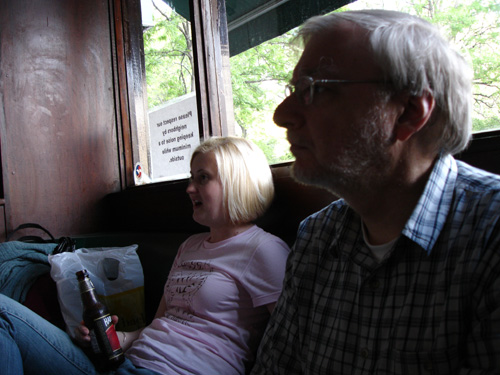
The group I met with Friday 12th of May at Columbia Teacher's College will have to forgive me that I don't have their names at my fingertips, this is unforgivable, but that's one of my great flaws. I am name-dropping immune, because any name will fall out of my mind in 20 seconds, onless it's constantly reinforced. I have a pretty good memory of graphics, topics and personalities, so cards are to me the most brilliant invention ever. Sorting through my cards after an event is so rewarding! Doesn't help those lovely students though, with no formal connection and hence, no cards.
What I do remember was how much it impressed me to meet with people who are looking at gaames and weblogs in new manners, and who want to have their questions answered in manners not including quick assumptions, nor have their answers expressed through popular catchphrases. My growing frustration with the lack of inventive and thorough empirical work in certain of the most visible areas of game studies or weblog research was stilled as I started to grasp the extent of new media research coupled with the concept of new media literacy which is happening in the teacher's colleges.
And so, after a lovely conversation at Columbia (somewhat delayed by those pesky subways that let me spend 45 minutes between 96th street and 120th street), a happy happy hour at the neighbourhood bar at their large favourite table and a great meal, I felt that this last trip across the Atlantic had opened a whole new set of possibilities to me. Next time in New York I have a group to exchange ideas with, a library to use and facilities for gaming if I ever feel the urge while on Manhattan and not carrying my own little computerised brain.


Wednesday, May 10, 2006
The coolest thing
"So what was the coolest thing?" my New York connection asked on the phone this morning, after the symposium was over. I couldn't answer, really, as the coolest thing was meeting people. I met Daniel Pargman (phd thesis), who I just like more each time we meet, Turner Whitted from Microsoft, who was a great surprise with his eclectic approach and great curiosity of all things, and Dina Mehta, whose blog I have noticed and who turned out to be as fun, smart and wise in the flesh.
There were others, of course, hip and less hip, busy and less busy - the Terra Nova crowd has become too large to lump them all together, but some of the ones from way back when are still as charming, curious and knowledge seeking as they used to be, new names which I have to go back and check in order to make sure I get them right in my mind still made a strong impression, while some confirmed my opinion from earlier and hence proved that some things are consistent, a very reassuing thing.
There were others, of course, hip and less hip, busy and less busy - the Terra Nova crowd has become too large to lump them all together, but some of the ones from way back when are still as charming, curious and knowledge seeking as they used to be, new names which I have to go back and check in order to make sure I get them right in my mind still made a strong impression, while some confirmed my opinion from earlier and hence proved that some things are consistent, a very reassuing thing.
Tuesday, May 09, 2006
Key Questions
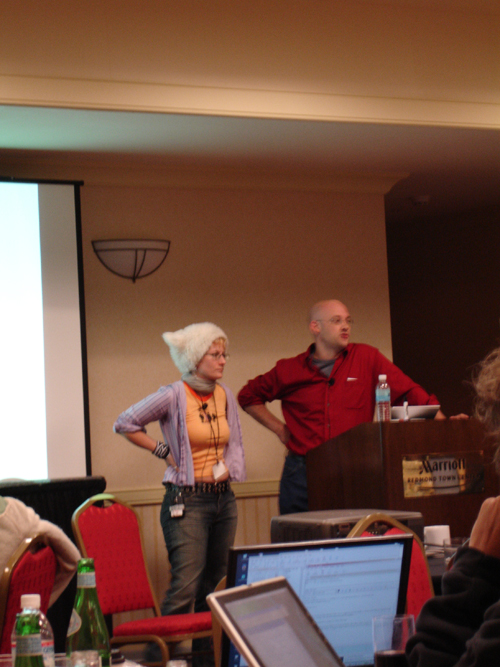
Rather than doing a keynote talk, to introduce their own thoughts on online communities and social texts, danah boyd and Clay Shirky are doing a session of key questions. They had all participants email them with central research questions we all want to explore/see the answer to. Now they are reading these questions and asking the people out here for the answers.
This is an interesting idea, but I have to admit, the many sessions here have been so fragmented that I was looking forwards to hearing somebody who know what they are talking about finish a fully shaped argument on something they care about and want to share. The research question form is disruptive and hard to follow, and underlines the cultural and linguistic differences between the different participants. Or perhaps just between me and the different participants.
Yes, there are a lot of interesting questions coming up. Problem is that I am totally filled up now. Perhaps this had been a good beginning, so that we could have used these questions as the background for forming all the discussion goups. As an ending it does the opposite of rounding up and concluding, as it forces the entire field again wide open. Which may be what the cute couple try to do.
-----
Update: after the key questions they did keynotes. Shirky was talking about something something we made open online spaces which functioned in different ways for people, while boyd had some interesting reflections on how myspace developed. Both were descriptive rather than reflective or analytical.
Not a bad thing, but I am starting to hunger for the well-phrased argument, the thoroughly referenced hypothesis. I never knew I had become such an academic stickler, 15 years ago I would have been deeply impressed with the profound ideas being thrown on the table here.
Day 2, first round
Julian Dibbell, what difference does a game make? What impact does games bring to social spaces? The matter of community, social spaces, etc etc.
"Rape in Cyberspace" - a moment of making community visible within Lambda MOO.
From "The Well" - as real life touches the lives of others.
How does the reality of virtual spaces touch on the ludic or game like quality of game spaces?
Julian asks some interesting questions and I am not sure if I will get further than this for a while. I think however that the answer is not that hard. A game provides people with some really important ..forutsetninger.. which are needed to create a functioning social space.
1) A common background. In order to have something to communicate about, we need common experiences. It does not have to be the same experience, but it needs to be a comparable one.
2) A chance to assist each other. Community and social spaces are made out of the exchanges of gifts - they live by a gift economy. By playing a game together we can share knowledge, hints, objects, lend a hand in tasks or offer protection. All of these are the kind of gifts that we give to ach other in a good fleshworld social space, and a multi-player game lends itself to this.
3) Challenges and tasks. Communities grow around common projects. People who have a shared goal cooperate and connect, and care for each others on many levels. They need to know a lot about each other in order to know how to utilise the resources of the group in order to achieve their goals. Again, games lend themselves very easily to this, while it is the kind of mechanisms which build communities.
And these are just three aspects. If we go into this further we will find many more aspects of flesh-world communities which the games facilitate. I would propose that we don't look at digital spaces and ask why games are so good for them, but look seriously at communities grown up around other games in the flesh world, and try to find out what is different and if there is a difference. Is it something else to play World of Warcraft than to play bridge, when we look at it as a focus for a community?
"Rape in Cyberspace" - a moment of making community visible within Lambda MOO.
From "The Well" - as real life touches the lives of others.
How does the reality of virtual spaces touch on the ludic or game like quality of game spaces?
Julian asks some interesting questions and I am not sure if I will get further than this for a while. I think however that the answer is not that hard. A game provides people with some really important ..forutsetninger.. which are needed to create a functioning social space.
1) A common background. In order to have something to communicate about, we need common experiences. It does not have to be the same experience, but it needs to be a comparable one.
2) A chance to assist each other. Community and social spaces are made out of the exchanges of gifts - they live by a gift economy. By playing a game together we can share knowledge, hints, objects, lend a hand in tasks or offer protection. All of these are the kind of gifts that we give to ach other in a good fleshworld social space, and a multi-player game lends itself to this.
3) Challenges and tasks. Communities grow around common projects. People who have a shared goal cooperate and connect, and care for each others on many levels. They need to know a lot about each other in order to know how to utilise the resources of the group in order to achieve their goals. Again, games lend themselves very easily to this, while it is the kind of mechanisms which build communities.
And these are just three aspects. If we go into this further we will find many more aspects of flesh-world communities which the games facilitate. I would propose that we don't look at digital spaces and ask why games are so good for them, but look seriously at communities grown up around other games in the flesh world, and try to find out what is different and if there is a difference. Is it something else to play World of Warcraft than to play bridge, when we look at it as a focus for a community?
On the lake
Monday night was used for a three hour trip on the lake, down towards Seattle City Center and past the home of Bill Gates.




Monday, May 08, 2006
Reputation
Reputation as currency. Can reputation be transferred in the same way as currency, can we use the concepts symmetrical or asymmetrical and can we even compare money and reputation?
It obviously has a value, social, economical, cultural and professional. Can we talk about Bourdieu here?
But the argument is about something very different from what I thought we were entering into, and talking about branding rather than personal authorithy and reputaiton. I am confused by the argument, by transferring reputation to a brand, and claming that the individual is a brand as much as a person.
So what is George Bush, a brand or a person?
I am lost in the argument, seeing that my references are not within the sphere we are touching, and the language eludes me, as does the references of the people discussing reputation. My social and cultural capital has little value here, Martha Stewart and Oprah as examples which elude me, while I want to talk about Bourdieu, Sennet and Goffman, and games, certainly, but we are discussing how Oprah can change the book industry from her show, by using her reputaiton.
There is more flaws to this argument than just me not being able to say that brand equity is the same as reputation, but the lack of common references leaves me lost.
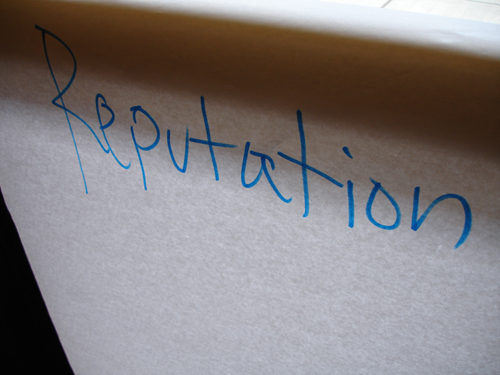
It obviously has a value, social, economical, cultural and professional. Can we talk about Bourdieu here?
But the argument is about something very different from what I thought we were entering into, and talking about branding rather than personal authorithy and reputaiton. I am confused by the argument, by transferring reputation to a brand, and claming that the individual is a brand as much as a person.
So what is George Bush, a brand or a person?
I am lost in the argument, seeing that my references are not within the sphere we are touching, and the language eludes me, as does the references of the people discussing reputation. My social and cultural capital has little value here, Martha Stewart and Oprah as examples which elude me, while I want to talk about Bourdieu, Sennet and Goffman, and games, certainly, but we are discussing how Oprah can change the book industry from her show, by using her reputaiton.
There is more flaws to this argument than just me not being able to say that brand equity is the same as reputation, but the lack of common references leaves me lost.

Productive and participatory value
This is a distinction which can be very useful to understand what has value in gamespaces in relation to the fleshworld.
But was it Zimmerman and Salen who coined magic circle? Wasn't it Huizinga? Sometimes scholarship becomes like a telephone game, or the "share a secret" game danah boyd made us all play this morning.
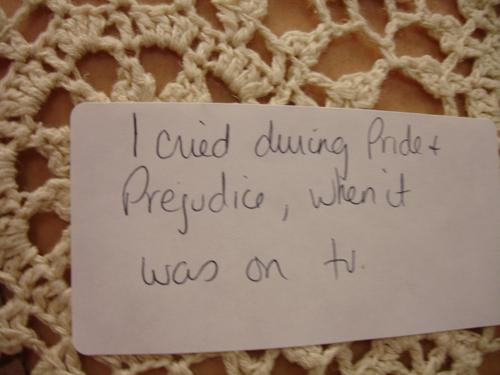
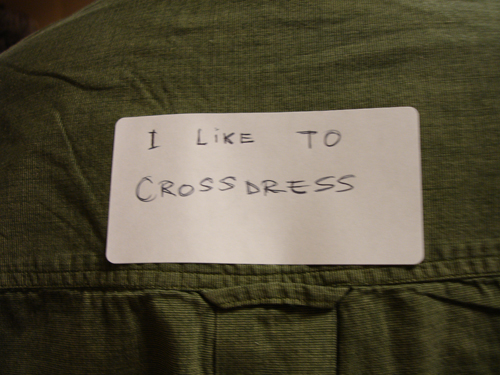
But was it Zimmerman and Salen who coined magic circle? Wasn't it Huizinga? Sometimes scholarship becomes like a telephone game, or the "share a secret" game danah boyd made us all play this morning.


Backchannels
The backchannel is busy and chatty at this conference, but so far it is dominated by a small group of participants. Watching the comments scroll by and go between playful and serious is an interesting study of power, self-assertiveness and social connections. I find myself becoming caught up in watching who says what to whom and how rather than listening or caring about what is really said, and I find myself wondering how this will work to enhance the conference.
Games and transgression
Constance Steinkuehler talks about what we can learn from games and take into school, and points out that games are about transgression, and so we will get a dilemma of Christian Rock - how can you be "good" and still a rebel?
I may have been too slow and sleepy, but I don't really see the problem. Games are not transgressional. They can be. Some are even liminal. But games have always been used to teach, train and learn. Competition is a very good learning tool for some, while playful social group activities are good for others. For educators to look to how to integrate the new technology games to the classroom is more a matter of understanding how to use the technology than to understand how to use games.
I think, at least. And now thinking of that I missed the whole next conversation.
I may have been too slow and sleepy, but I don't really see the problem. Games are not transgressional. They can be. Some are even liminal. But games have always been used to teach, train and learn. Competition is a very good learning tool for some, while playful social group activities are good for others. For educators to look to how to integrate the new technology games to the classroom is more a matter of understanding how to use the technology than to understand how to use games.
I think, at least. And now thinking of that I missed the whole next conversation.
MSR2006
The organiser on the first night, happily wielding a glass of wine and a wide grin. Liz Lawley at the first adrenalin high!
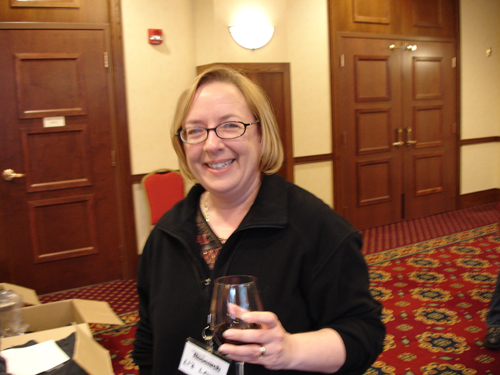
For those who want to see us all live (but 27 second delayed), there is a feed.
And if you want to join us at IRC, the server is irc.freenode.net, and the channel is scs2006.

For those who want to see us all live (but 27 second delayed), there is a feed.
And if you want to join us at IRC, the server is irc.freenode.net, and the channel is scs2006.
Breakfast
And to those who was worried about my diet while I am here, here are pictures.
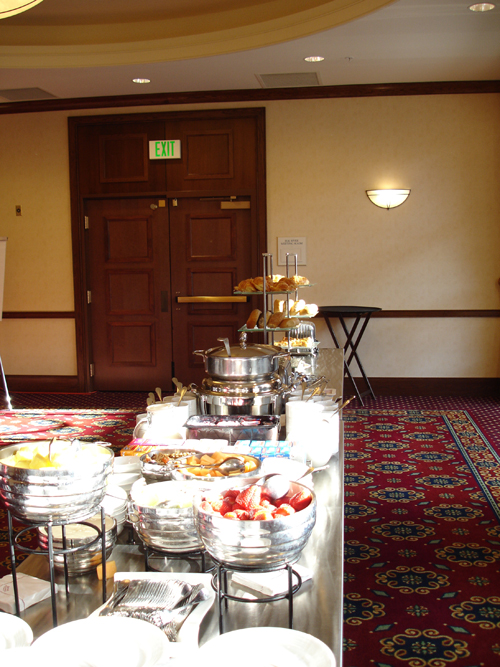


So plenty of fruit and berries, warm oatmeal and freshly made coffee. Microsoft is looking after us! No properly brewed tea, but right now frequent shots of espresso is what keeps me alive anyway.



So plenty of fruit and berries, warm oatmeal and freshly made coffee. Microsoft is looking after us! No properly brewed tea, but right now frequent shots of espresso is what keeps me alive anyway.
Lagged
It's almost 5 am. I have been awake since 1.45. I am hungry, have a headache and can't sleep. Jet-lag usually never bothers me, but on this trip it is suddenly totally overwhelming. I am in Redmond, Seattle, Washington, on the MSR 2006 Social Computing Symposium, and I am so tired I have no idea to survive tomorrow. Perhaps a couple of hours sleep will grace me after this post, and then be really bad and nap a little in between events. The worst things to do, I know. And drink enough water and get exercize, and I should be OK in... 2-3 days.
Right.
Think friendly thoughts and send energy to my deprived brain, going to need it now! This looks like a fun event, lots of friendly interesting people I really would love to have long and interesting conversations with, and obviously many blog-worthy options, so I am so happy to be here I have no idea why the whole jet-lag hasn't been chased away by happy hormones already.
Right.
Think friendly thoughts and send energy to my deprived brain, going to need it now! This looks like a fun event, lots of friendly interesting people I really would love to have long and interesting conversations with, and obviously many blog-worthy options, so I am so happy to be here I have no idea why the whole jet-lag hasn't been chased away by happy hormones already.
Sunday, May 07, 2006
In-flight grinding
Since T. L. Taylor could raid Molten Core in flight, I had to at least try to grind a little in Tanaris. And so while people around me on the plane between Copenhagen and New York were changing nappies, solving sodoku puzzles, reading newspapers and adjusting their spreadsheets, I was stealthing through a pirate camp opening lockboxes, improving my picklock skill and searching for a chest which supposedly shall drop a nice dagger.
I have to admit that the connection was not as fast as on ground, and I did die more than once. But my skill improved and I now know the spawn spots of those chests, so hey, not too bad for the two hours my batteries lasted!

I have to admit that the connection was not as fast as on ground, and I did die more than once. But my skill improved and I now know the spawn spots of those chests, so hey, not too bad for the two hours my batteries lasted!

Subscribe to:
Comments (Atom)
